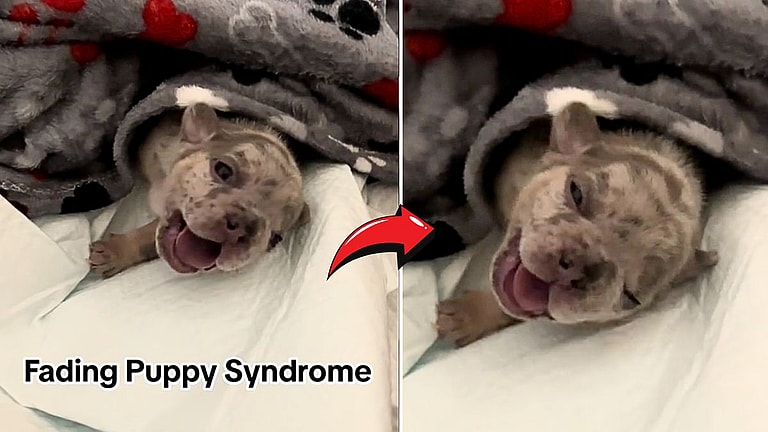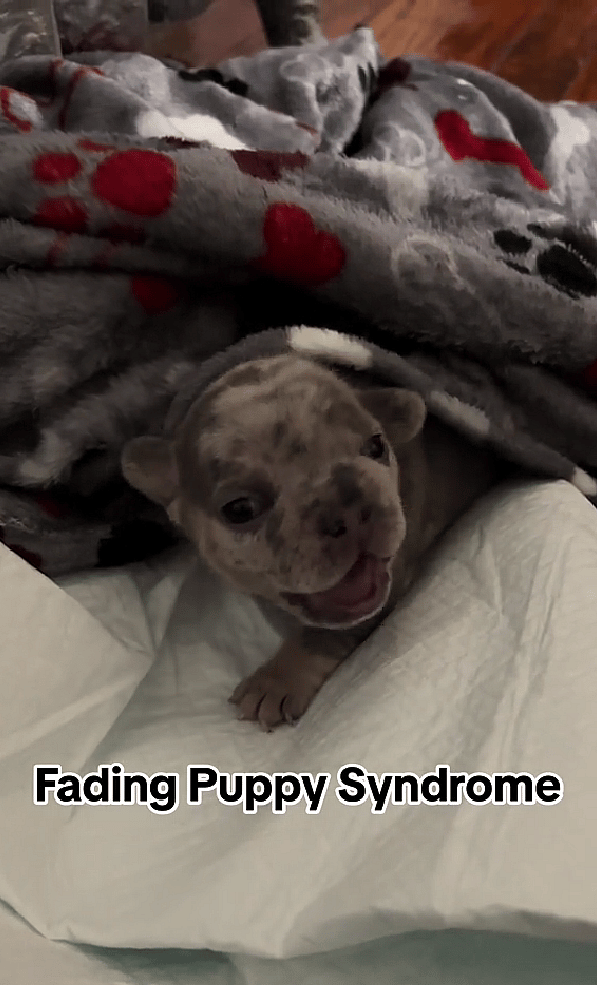Little Newborn Puppy Couldn’t Stop Crying — How to Spot Fading Puppy Syndrome Before It’s Too Late
Young puppies, with their tiny limbs and adorable faces, are precious little beings. Yet, their fragility matches their cuteness, requiring meticulous care and protection to survive. Tragically, even with the best efforts, some succumb to illness despite all odds.

A TikTok video captures a female French Bulldog puppy making unusual crying sounds, appearing to be in pain and distress. Tragically, her illness led to her passing.
Owner Helpless To Save Puppy
Maria Rojas uploaded the video and expressed her desperation to help ease the Frenchie pup’s pain. The mother of this puppy is named Zoe. Mama dog Zoe had given birth to a litter of four puppies – two males and two females – through c-section.
@m.rojas17 Trying to help this little one🥲 it breaks my heart to see her like this😭 Any suggestions on what I can do to help her??? #fadingpuppysyndrome #frenchbulldog #help #viral #fyp ♬ original sound – Maria R🎀
About two weeks later, the female puppy in the video had symptoms of cold and despite Maria’s efforts, she couldn’t save her.
This video sheds light on fading puppy syndrome as the overlay text mentions the condition. The post attracted several comments from people sharing their experiences with the condition.
Skyjoe Paise said, “I’m sorry I went through this too with 2 of my babies, it’s so tough.” Another user commented, “My newborn bubba passed away this morning, I’m so sorry for your loss, maybe our puppies are playing together in puppy heaven :)”

What is Fading Puppy Syndrome?
So, what exactly was wrong with this puppy, and what is fading puppy syndrome in puppies? Here is what the veterinarians have to say about it.
“Fading puppy syndrome is a condition where newborn puppies face failure to thrive within the first few weeks of life and may die,” explains Dr. JoAnna Pendergrass. It includes conditions that hinder a newborn puppy from achieving normal growth and development. The puppy may have been healthy at birth but within two to three weeks of age, their health deteriorates substantially.
Veterinarians at VCA Animal Hospitals state, “Normal pre-weaning losses in dogs, including stillborn puppies, can be up to thirty percent (30%), with about half of these deaths occurring within the first week of life.”

Why does Fading Puppy Syndrome Occur?
During the first two weeks of life, puppies are extremely fragile and susceptible to illness and environmental stress. Here’s why:
- Thermoregulation: They can’t regulate their body temperature independently, making them vulnerable to extreme temperatures.
- Fluid and energy balance: Their ability to maintain fluid and energy balance is limited, putting them at risk of dehydration and energy crashes.
- Immune system: Their immune systems are still developing, leaving them with limited protection against infections.
- Infection risk: As a result, puppies are more likely to succumb to various causes, making this a critical period for close monitoring and care.
Fading Puppy Syndrome Signs
The symptoms of fading puppy syndrome are often vague and difficult to detect. Unfortunately, by the time the signs become apparent, it is often too late to save the puppy.
Puppies affected by this condition may exhibit low birth weight or fail to gain weight at the same rate as their siblings, earning them the label of “runt” of the litter. They may also display decreased activity and struggle to suckle. Additionally, these puppies tend to separate themselves from their mother and the rest of the litter.
As the condition progresses, affected puppies may cry weakly in a high-pitched tone, before quickly deteriorating into extreme weakness and loss of muscle tone. Ultimately, this condition can be fatal.
Fading Puppy Syndrome Treatment
Treatments for fading puppy syndrome usually involve a combination of warmth, fluids, and oxygen. If the pup has a bacterial infection, antibiotics will be given. In addition, the puppy will be hand-fed until they are strong enough to nurse independently.
To ensure the puppy’s recovery, monitor their weight daily and contact your veterinarian if they continue losing weight. Additionally, check the hydration levels daily by observing the puppy’s urine color and the moistness inside their mouth. A dry mouth and dark urine can be a sign of dehydration.
You must give medications to your dog as prescribed by the veterinarian, feed the puppy according to the recommended regimen, and seek immediate veterinary attention if the puppy’s condition worsens.
If your puppy is able to return home after treatment, the vet will provide you with specific at-home care instructions.
When someone asked for tips for fading puppy syndrome on a subreddit, r/DogBreeding, a user, u/Chuggachoochoo3, recommends, “You need to keep him warm (heating pad under the blanket), rub vigorously so he cries out loud, making sure his lungs are clear, make liver water, try to make sure it’s nursing. Keep trying.”
Frequently Asked Questions (FAQs)
How long does fading puppy syndrome last?
Puppies with fading puppy syndrome often die within 24 hours of showing signs. Immediate veterinary care is crucial, but some causes, like birth defects, are untreatable, with a 12-36% mortality rate.
What is the survival rate of fading puppy syndrome?
Approximately 30% of puppies are affected by fading puppy syndrome, as per Front of the Pack. Sadly, the prognosis for puppies diagnosed with the condition is poor, with around half of them succumbing to the condition within the first seven days of life.
How to treat fading puppy syndrome at home?
To treat fading puppy syndrome at home, provide adequate fluids and maintain a warm environment (85-90°F) for the first four days. Use a heat lamp over the whelping box and gradually decrease the temperature to 80°F by day 7-10.
Is fading puppy syndrome contagious?
According to Vetster, fading puppy syndrome can also be triggered by contagious or infectious diseases. To minimize the risk of transmission to healthy puppies, maintain good hygiene practices, ensure regular veterinary care, including deworming and vaccination, and monitor the maternal health and fitness of breeding animals before, during, and after pregnancy.






